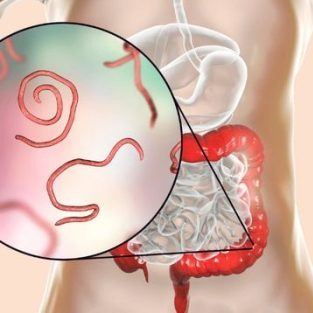
Understanding Parasites and the Immune System
Understanding Parasites and Their Impact
In this blog, we will talk about Parasites and the Immune System. Parasites are commonly thought to be a severe problem mainly in Third World countries, although this could not be further from the truth. Pinworms, tapeworms, hookworms, ringworms, whipworms, roundworms, heartworms, and Giardia Lamblia are just a few of the common parasites found in western world countries today.
The Relationship Between Parasites and Health
Parasites are scavenging organisms that live inside of us and can cause a variety of major health problems, including cancer. Parasites are opportunistic intruders, meaning they prey on their host (you) when the gut ecology is sick or the immune system is weak. Our immune system is our first line of defence against invading bacteria, viruses, and parasites; in order to stay healthy, it’s critical that it’s kept free of additional burdens so that it can continue to support our immunological function.
The Impact of Diet on Parasite Health
When parasites are given their preferred diet of sugars, processed foods, toxins, and excessive carbohydrate consumption, they can thrive in the intestinal system, liver, pancreas, brain (and many other locations in the body). The risk of these unwelcome guests, is that as their waste products are released into the body, their eggs hatch, and larva grow in tissue all over the body and they can become exceedingly toxic and even lethal.
How many parasite species are there that can affect humans?
There are over 300 different types of parasitic worm species and over 70 protozoa species known that can live on/in humans. However, there are also studies that show there could even be thousands more of other unknown types that we aren’t aware of.
What is the most common parasite in humans?
The Most Common are Intestinal Parasites.
The main 4 types of parasites
Flukes and worms
There are several hundred different types of flat worms (such as tape worms) and round worms in this category (such as hookworms and ascaris). Liver flukes are the most common parasite and are also included in this group because their eggs are frequently found in swimming pools, hot tubs, bathtubs, gymnasium floors, and everything you touch that others touch, such as armrests on aeroplanes, buses, and trains, toilet flush levers in public or private bathrooms, and elsewhere, these infect most people, at least to some degree. Because they are tough to kill, even municipal water supplies may include some. Worms and flukes rarely kill people directly. They just build up in the liver, intestines, or elsewhere, causing a variety of symptoms.
Protozoa
Protozoans include Amoebas, Giardia lamblia for example. These are minuscule in size and are more commonly connected with Mexico, South America, and tropical nations with contaminated food and water. These can kill weak or ill persons if they travel from the intestines to the brain, lungs, heart, or other essential organs through a weak area in the intestinal wall. Spices can assist to alleviate these symptoms. Toxoplasma gondii which is also another protozoan parasite can be found in many countries and can infect most species of warm-blooded animals, including humans, and cause the disease toxoplasmosis. Cats are the main carriers. Usually, peoples infections are from handling cat faeces.
Spirochetes
Spirochetes are spiral-shaped creatures that cause Lyme disease, malaria, and other diseases. Lyme spirochetes, in particular, are highly common and are transferred by flies, ticks, and a variety of other insects.
Fungi and yeasts
Yeasts and fungus, such as Candida albicans, are sometimes included in the parasite group of infectious agents. Candida is a resilient organism that is quite common.
The Diversity of Parasitic Organisms and Their Impact on Your Immune System
As you can see, parasitic organisms come in a wide variety of forms, numbering in the hundreds. Unlike bacteria and viruses, parasites are generally large enough to be seen without a microscope, and some may even be seen with the naked eye.
In the human host, parasites overburden you with their waste, which is subsequently reabsorbed into your bloodstream, compromising your overall immune system function.
Scientific studies show links to parasites and Illnesses
- The intestinal fluke (Fasciolopsis buskii) has been linked to an increased risk of cancer
- The sheep liver fluke (Fasciola hepatica) has been linked to environmental illnesses
- The human liver fluke Clonorchis sinensis has been linked to an increased risk of GI (gastrointestinal illness), cancer, and inflammation.
- The common roundworm (Ascaris lumbricoides) has been linked to an increased risk of diabetes type 2 and asthma.
- Toxoplasma gondii has been linked as a possible cause and increased risk of getting schizophrenia and other mental illnesses.
- The pancreatic fluke of cattle (Eurytrema pancreatica) has been linked to possibly increasing the risk of getting diabetes type 2.
How do you get Parasites?
Parasites can infect you by entering the body in several ways through;
- Contaminated Food
- Raw veggies- can make an ideal breeding ground for parasite eggs to hatch- if they aren’t washed properly they can easily be digested this way
- Tapeworms are known to live in rare meat, particularly undercooked pork, beef and seafood.
- Contaminated Water (drinking water, swimming in lakes, rivers etc)
- Sex- parasites are transmitted more easily through sexual practises than venereal illnesses.
- Contaminated Soil
- Dirt under the nails
- People
- Pets
- Poisonous build-up of colonic plaque in the colon walls, which provides an excellent breeding environment with its warm, dark, toxic, and wet intestinal climate.
- Ticks, insects, and worms.
Signs you have a parasitic infection
What are symptoms of parasites in humans? Below are some signs you may have a parasite infection. Please keep in mind that everyone can react differently to having parasites. For instance, some people who have been diagnosed with parasites might have only had a few of these symptoms, but some more unfortunate might get them all. It really depends on which parasite has caused the infection and the state of your immune system.
- Diarrhea
- Gas
- IBS (irritable bowel syndrome)
- Loose stools
- Constipation
- Digestive tract issues
- Bloating
- Urinary tract Infections
- Abdominal pain
- Weight loss
- Weight gain
- Itching in the anus or the vaginal area
- Swollen lymph nodes
- Fatigue
- Nausea or vomiting
- Rashes, eczema, hives, and itching on the skin
- Muscle and joint pain
- Mood disorders such as depression and anxiety
- Anaemia (iron deficiency)
- Teeth grinding
- Hunger- feeling hungry all the time even when eating properly
- Sleep disorders such as insomnia, sleep apnoea
- Yeast infections that are recurring
- Bad breath
- Bad body odour
- Frequently prone to reoccurring illnesses such as colds etc.
Can parasites go undetected?
Yes, it is estimated that 80% of adults and children have parasitical worms in their bodies. However, if your immune system is working properly, it will maintain the right balance. It is when there is an imbalance in your immunological function that these unwanted guests can take advantage and take over causing a lot of havoc to your health.
Approach to Parasitic Infections
How to test for parasites
Get in touch with us! There are numerous integrative pathology tests we can provide you with such as the Faecal Multiplex DNA PCR -Stool Test from NutriPath.
The faecal PCR test detects parasite and bacterial DNA, making it a more accurate procedure than a standard Micro, Culture, and Sensitivity (MC&S) test, which is typically requested by traditional laboratories.
Traditional microbiological approaches may miss pathogens that cause infectious gastroenteritis, but the faecal PCR profile can detect them quickly, specifically, and sensitively. PCR relies on parasite molecular screening rather than parasite detection based on a microscope examination of faeces (stool samples).
Ready to Reclaim Your Health?
Are you concerned about parasites and their impact on your immune and gut health? Don’t let these unwelcome guests compromise your well-being! At Wholistic Natural Health, we specialize in holistic health solutions, working closely with NutriPath Pathology and utilizing advanced investigative measures to uncover the root causes of immune and gut health problems.
Regardless of your health issue, we are committed to investigating until we find the root cause. If we discover a parasitical infection, we will devise an individualized treatment plan specifically tailored to correct the problem and restore your immune system to optimal health.
We are a global network of practitioners offering remote services to meet your needs, wherever you are in the world. We can send pathology tests directly to your home, conduct consultations via telephone or Zoom, and deliver any necessary products, supplies, and treatments right to your doorstep.
Contact us today to schedule a consultation, and let’s embark on a journey to restore your health and vitality, no matter where you are located!
Ready to dive deeper into your health? Request your free online root cause analysis health assessment to get started on your health journey today!
We hope you enjoyed knowing more about Parasites and the Immune System. Let us know below in the comments!



